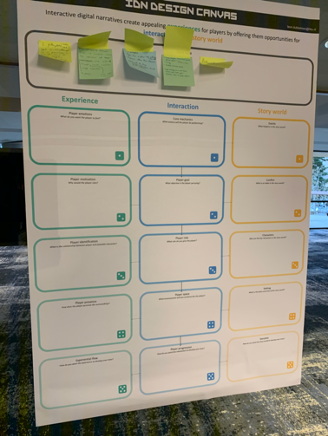Methods in Interactive Narrative Pedagogy: Card-based Prototyping – 2020 Edition
Call for Participation
We invite participants to our half-day workshop on paper-based prototyping for interactive digital narratives. Participants will learn how to apply a structured approach to prototyping, using purpose-made cards. In the process of developing a prototype, participants will get to know several card-based formats and through their feedback will help us to improve the card sets. We ask participants to register via Google Forms and provide a short statement of motivation, as well as being prepared to give a short presentation of their prior experiences with card-based prototyping methods.
General description
Educating a new generation of professionals and scholars in Interactive Narrative is an important consideration for the nascent field. Paper prototyping plays an important role in the creation of interactive digital narratives (IDN). A structured prototyping approach can help improve the process of creating IDNs. In particular, pre-made, specialized card designs can speed up the process considerably and also help in the transition to digital prototypes. In this workshop, we will continue the work from the previous iteration of the workshop to evolve structured methods and use pre-made cards in successive rounds of working towards a detailed prototype. We will also use this opportunity to evaluate different approaches through questionnaires and interviews.
Paper Prototyping
Paper-based approaches are often observed in the practice of interactive narrative design, for example in workshops (see figure 1), but also in presentations at venues such as the Narrative Summit at the Games Developer Conference often show index cards or post-its on the wall of design companies and game studios.
While the use of such paper-based methods is certainly methodological, it is striking how arbitrary its application in interactive narrative design appears. In contrast, specialized approaches towards card-based prototyping exist in game design or for user interfaces . Similarly, pre-made cards exist as tools to facilitate general design ideation. In the case of creative writing, Storymatic’s cards are used by writers to generate story ideas through the combination of cards with the goal to create a non-interactive narrative.
Card games provide additional inspiration for paper-based prototyping. In the storytelling card game Once Upon A Time players co-create a story using cards containing tropes from fairy tales. The goal for each player – as storyteller – is to lead their respective story to its ending without being replaced by other potential storytellers. If a player mentions a trope on a card owned by another player, the other player can take over the story and move the plot in a new direction. Thus, players must recognize and use story tropes but also should be creative and try avoiding them. Once Upon A Time trope cards have been suggested as a writing aid for linear fiction [8]but the game mechanic can be seen inspirational for IDN creation. In particular, the spatial or thematic exploration points within the fictional world can be seen as precursors of interactive narrative branching points.
There is thus an opportunity for prototyping cards which are purpose-made for interactive narratives. On this backdrop, we have developed several versions of paper design cards (see figure 1 for an example) and will use this material for the workshop.

For example, the cards in figure 1 represent beats – narrative units – in the IDN system ASAPS. They are an intermediate step between free-form cards and using the actual program and while they can be used for general purpose they are especially designed to enable rapid prototyping for a particular platform. Planning the general structure of an IDN has the advantage of identifying design issues through playtests before even starting with the actual coding. This also allows for a comparison of competing design ideas. Within our teaching efforts card based prototyping became a crucial element, which also aids with the beginners’ understanding of IDN.
Workshop Format
The half-day workshop kicks off with an introduction to the topic. A Research-through-Workshop (RtW) approach (thematic introductions, brief directed discussions, collaborative sketching and reasoned comparisons), developed in the organizers’ previous workshops, will be employed to produce insights through collective brainstorming at the conference and online. The process places emphasis on informal discussion, is programmatically open-ended, and will produce raw data, which will be accessible to the research community through a public website.
The workshop is designed for up to 20 participants. After a short introduction, participants will be divided into groups. They will start with the same material to develop an interactive narrative prototype, but use different sets of prototyping cards in iterative steps. At the end of the workshop, the results will be compared and evaluated by means of a questionnaire and interviews. This data is intended to generate insights for education and future research.
Contact: hkoenitz at g mail dot com